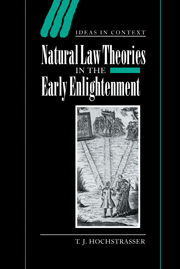Book contents
- Frontmatter
- Contents
- Preface
- 1 Introduction: natural law and its history in the early Enlightenment
- 2 Socialitas and the history of natural law: Pufendorf's defence of De Jure Naturae et Gentium
- 3 Voluntarism and moral epistemology: a comparison of Leibniz and Pufendorf
- 4 Christian Thomasius and the development of Pufendorf's natural jurisprudence
- 5 Natural law theory and its historiography in the era of Christian Wolff
- 6 Conclusion: the end of the ‘history of morality’ in Germany
- Bibliography
- Index
2 - Socialitas and the history of natural law: Pufendorf's defence of De Jure Naturae et Gentium
Published online by Cambridge University Press: 22 September 2009
- Frontmatter
- Contents
- Preface
- 1 Introduction: natural law and its history in the early Enlightenment
- 2 Socialitas and the history of natural law: Pufendorf's defence of De Jure Naturae et Gentium
- 3 Voluntarism and moral epistemology: a comparison of Leibniz and Pufendorf
- 4 Christian Thomasius and the development of Pufendorf's natural jurisprudence
- 5 Natural law theory and its historiography in the era of Christian Wolff
- 6 Conclusion: the end of the ‘history of morality’ in Germany
- Bibliography
- Index
Summary
THE CONTEXT OF THE SPECIMEN CONTROVERSIARUM
In the years following the publication in 1672 of Pufendorf's magnum opus, De Jure Naturae et Gentium, a lively polemic had begun concerning the theology and natural law contained in that work. In 1676 Valentin Alberti (1635–97), a leading professor of theology at Leipzig, and the most subtle of Pufendorf's critics, had published a fully-developed alternative to the argument of the De Jure Naturae in his Compendium Juris Naturae, Orthodoxae Theologiae Conformatum (Compendium of Natural Law in Conformity with Orthodox Theology). This work moved the standard of debate quite beyond the personal gibes and heretical insinuations of Beckmann and Schwarz, Pufendorf's original antagonists at the university of Lund. Instead, Alberti offered a powerful restatement of the orthodox Lutheran and Aristotelian synthesis on the divinely imposed nature and origin of natural law, finessed by the introduction of a concept of status integritatis. The purpose of this last innovation was to protect the orthodox view against Pufendorf's contention that divine imposition applied only in a pre-lapsarian existence, and that therefore natural law could only have originated in a combination of man's instinct for sociability and his calculation of the rationality of a social life as the best means to self-preservation. If it could be shown that man's moral nature was not entirely depraved at the time of the Fall then it could be argued that the uncorrupted remains of that divinely created nature had persisted in a post-lapsarian world as natural law.
- Type
- Chapter
- Information
- Natural Law Theories in the Early Enlightenment , pp. 40 - 71Publisher: Cambridge University PressPrint publication year: 2000
- 3
- Cited by



